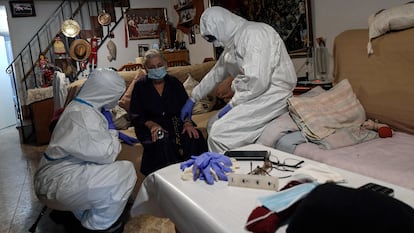Daily coronavirus deaths in Spain rise slightly to 430, but usual Tuesday increase is smaller than expected
The Spanish health authorities maintain that the Tuesday uptick does not affect the overall downward trend of the outbreak, with the rate of new infections holding steady at 2%

The number of daily coronavirus deaths registered in Spain was 430 on Tuesday, according to the latest figures supplied by the Health Ministry. This is a slight rise from yesterday’s figure of 399, which was the lowest Spain had seen since March 22, when there were 394 daily fatalities.
It should be noted that figures from around Spain have tended to be underreported around weekends and national holidays. As such, in recent weeks an uptick in the data has been expected on Tuesdays. However, the rise seen today was smaller than the Spanish health authorities were expecting.
The number of deaths is falling, but it continues to be a figure that worries usFernando Simón, the director of the Health Ministry’s Coordination Center for Health Alerts
There are also variations in the official statistics this week given that the Health Ministry is updating the historical series, after the government issued an order to the 17 regions in a bid to homogenize the different reporting of the data.
There have been a total of 21,282 official Covid-19-related fatalities since the pandemic hit Spain, with confirmed infections now reaching 204,178. Some 82,514 patients have recovered from the illness and have been discharged from hospital.
After reaching a peak of 950 fatalities on April 2, the number of daily coronavirus-related deaths began a slow descent. The figures last week, however, plateaued, with 410 on Sunday, 565 on Saturday, 585 on Friday, 551 on Thursday and 523 on Wednesday.
Speaking at the government’s daily press conference on Monday, Fernando Simón, the director of the Health Ministry’s Coordination Center for Health Alerts, said “the number of deaths is falling, but it continues to be a figure that worries us.”
Simón said that the rate of new infections continued to hold steady at 2%, with only three regions recording a rise of above 6%. ″There are regions with a very low rate of infection that are very close to a relatively controllable situation,” he explained. According to the health official, 50% of intensive care admissions are concentrated in one of Spain’s 17 regions, but he did not specify which one.
Simón added that the mass testing campaign, which will test around 30,000 families for the coronavirus in order to get a more accurate picture of the spread of the virus, has suffered from “some delays.” “It’s very important to know the real number of infected people, but it is not the only parameter needed to begin a process of change to control the pandemic,” he explained.
On Tuesday, the Spanish Cabinet is expected to release more details on the deescalation of the lockdown measures, in particular under what conditions children under 12 will be able to leave their home. Education Minister Isabel Celáa indicated in an interview with Spanish television network TVE that the Cabinet will approve an order to allow children to leave for a “short walk” but they will not be allowed to enter parks.
Health Ministry ordered to report on PPE measures

The Spanish Health Ministry will have to report to the Supreme Court every 15 days to outline what measures it is adopting to improve access to personal protective equipment (PPE) in public and private healthcare centers. That’s what the Supreme Court ruled on Monday in response to a case brought by doctors’ unions, which demanded the government immediately provide health workers with PPE. The top court rejected the union’s request, but agreed to call on the ministry to adopt “all measures within its reach” to improve the distribution of PPE to health workers, and to report on these efforts every two weeks.
The news comes after it emerged that thousands of healthcare workers were exposed to the novel coronavirus due to defective face masks that had been distributed by the government. The Health Ministry ordered the withdrawal of the faulty material on Friday, but it is still not known how many staff may have used the items.
Facebook to investigate “fraudulent activity” on Health Ministry page
Facebook will investigate alleged “fraudulent activity” on the official page of the Spanish Health Ministry, according to a ministry press release issued on Monday. In the statement, the ministry said that it had made the social media giant aware of the problem on Friday.
According to the ministry, hundreds of allegedly fake Facebook accounts, “with no followers, no posts, that have been created on the same date” have been interacting with their page. In some cases, EL PAÍS was able to see that these accounts – which have profile pictures of foreign men and women – have been reacting with “like” and “love” to the ministry’s posts. On Monday, the Health Ministry’s official Facebook account had 489,200 followers, almost five times the number it had on March 14, when the state of alarm was declared, according to official sources.
Catalonia
The spokesperson for the Catalan government, Meritxell Budó, claimed on Monday that there would have been fewer coronavirus deaths in the region if Catalonia was an independent state. “I am sure that there would not have been as many deaths or infections,” she said in an interview with regional network Ràdio 4, on how the coronavirus crisis would have affected an independent Catalonia.
Budó said that an independent Catalonia “would have taken measures in a different way," and argued the regional government would have declared a state of alarm and issued stay-at-home orders 15 days earlier than Spanish Prime Minister Pedro Sánchez.
Running of the Bulls cancelled
Pamplona city council announced on Tuesday that the world-famous Running of the Bulls has been suspended this year due to the coronavirus. In a press release shared on Twitter, the local authority said the Sanfermines fiestas would be held be held “as soon as possible” but did not specify a date.
Travel restrictions extended
The government has extended the travel restrictions already in place at Spain’s borders until May 15. Only Spaniards or residents of Spain, residents of the European Union and countries associated with the Schengen Area who can prove that they are returning to the place of residence will be permitted entry into Spain.
As well as the aforementioned cases, travelers will be permitted to enter Spain at these border points if they are diplomatic staff; if they hold a long-term visa issued by an EU state or a country from the Schengen Area to which they are headed; if they are cross-border workers; if they are health professionals or take care of seniors and are on they way to carry out their duties; if they are employees in the sector of goods transportation; and if they are flight crew who are needed to carry out air-freight activities.
With reporting by Reyes Rincón and Pere Ríos.
English version by Melissa Kitson.
Tu suscripción se está usando en otro dispositivo
¿Quieres añadir otro usuario a tu suscripción?
Si continúas leyendo en este dispositivo, no se podrá leer en el otro.
FlechaTu suscripción se está usando en otro dispositivo y solo puedes acceder a EL PAÍS desde un dispositivo a la vez.
Si quieres compartir tu cuenta, cambia tu suscripción a la modalidad Premium, así podrás añadir otro usuario. Cada uno accederá con su propia cuenta de email, lo que os permitirá personalizar vuestra experiencia en EL PAÍS.
¿Tienes una suscripción de empresa? Accede aquí para contratar más cuentas.
En el caso de no saber quién está usando tu cuenta, te recomendamos cambiar tu contraseña aquí.
Si decides continuar compartiendo tu cuenta, este mensaje se mostrará en tu dispositivo y en el de la otra persona que está usando tu cuenta de forma indefinida, afectando a tu experiencia de lectura. Puedes consultar aquí los términos y condiciones de la suscripción digital.









































